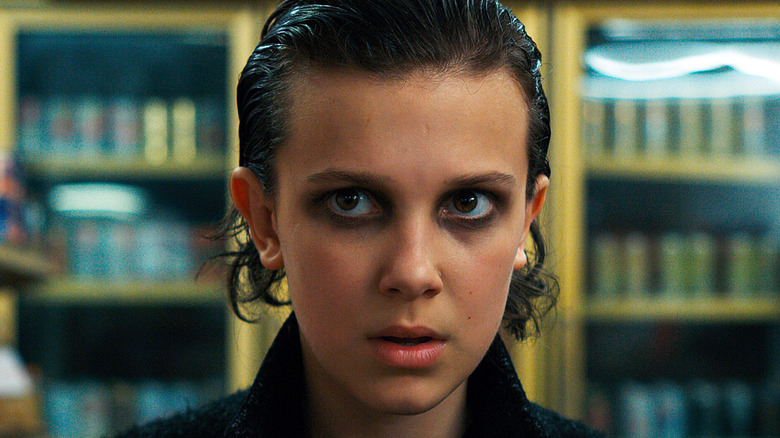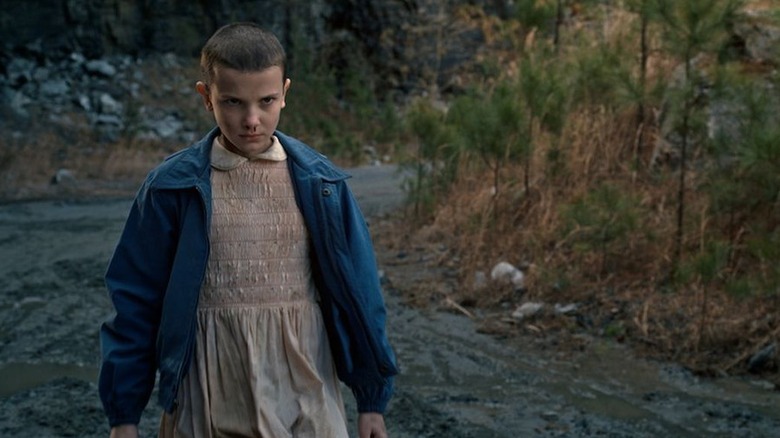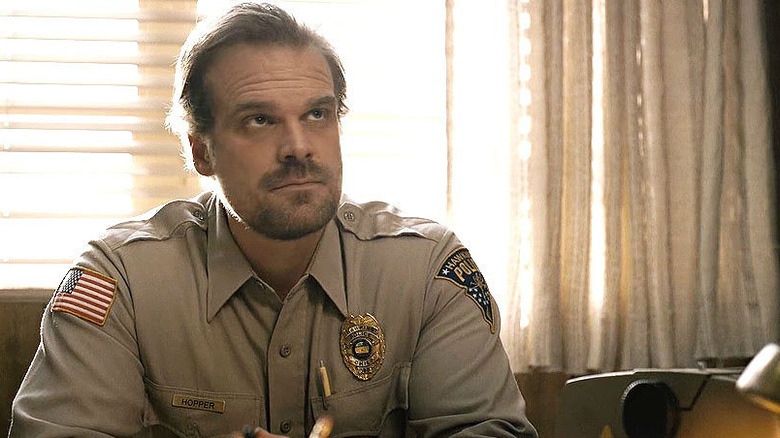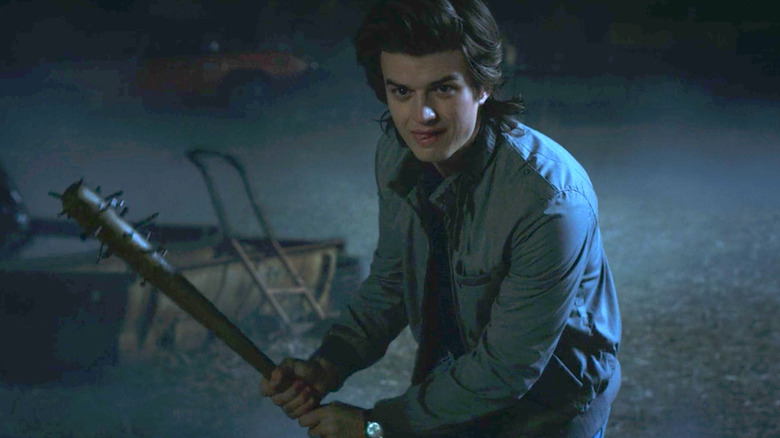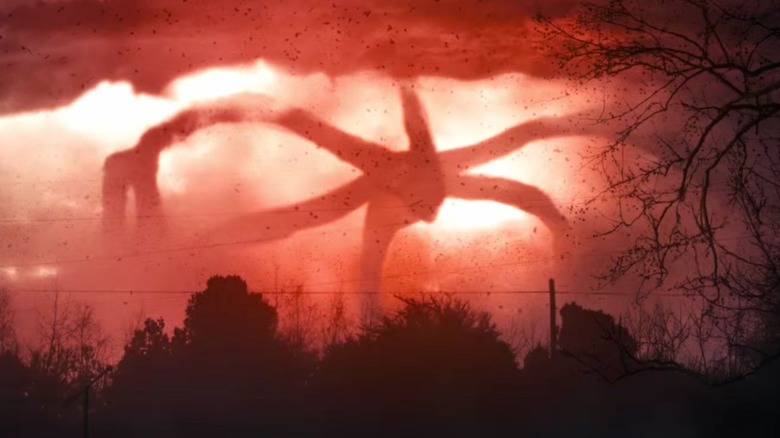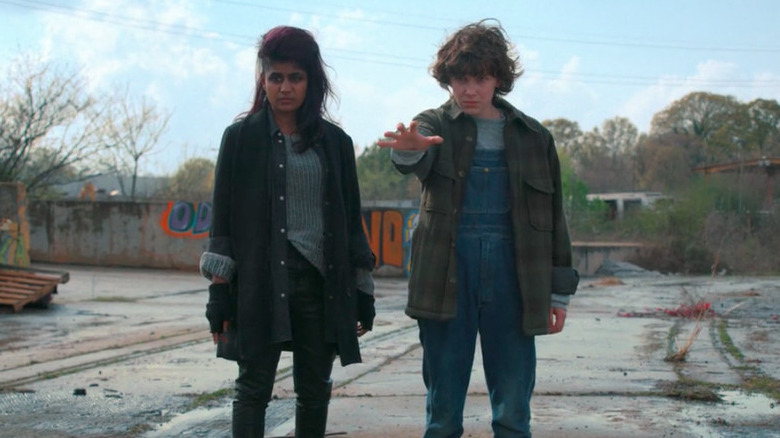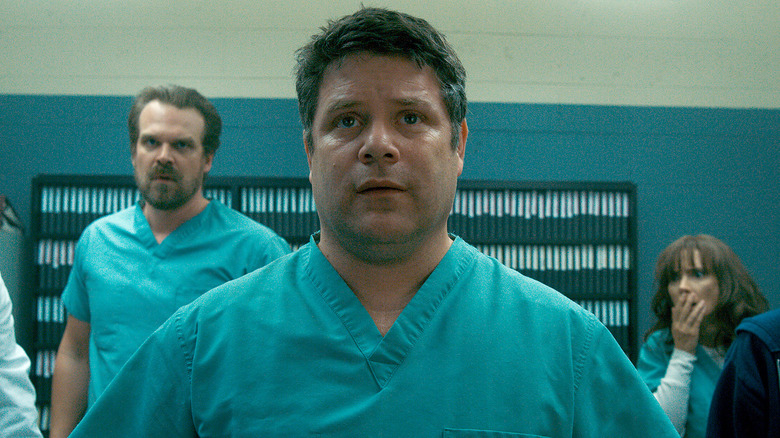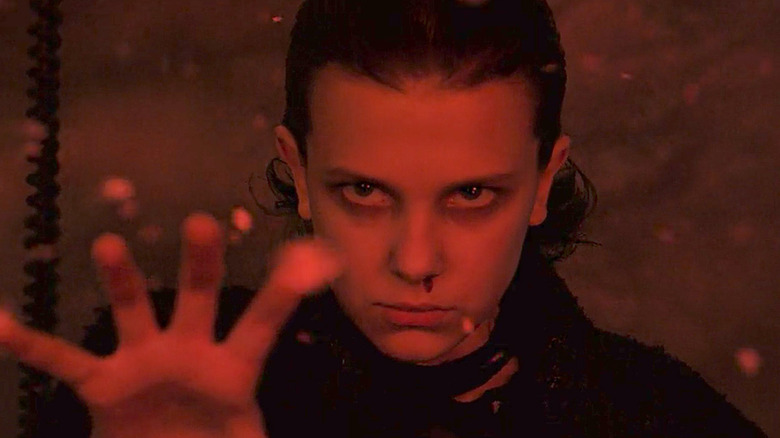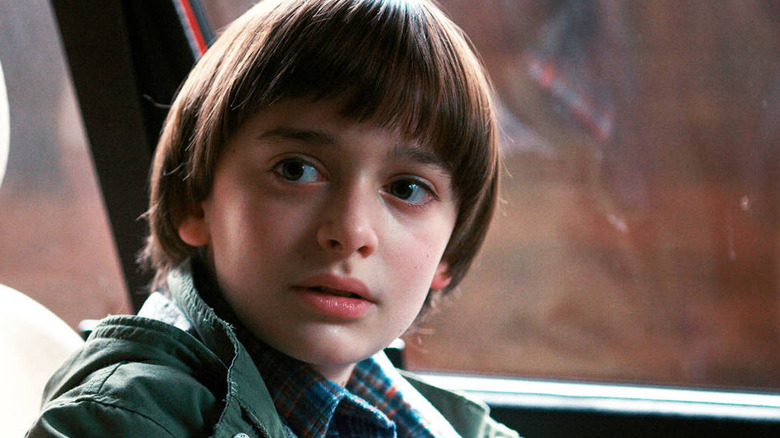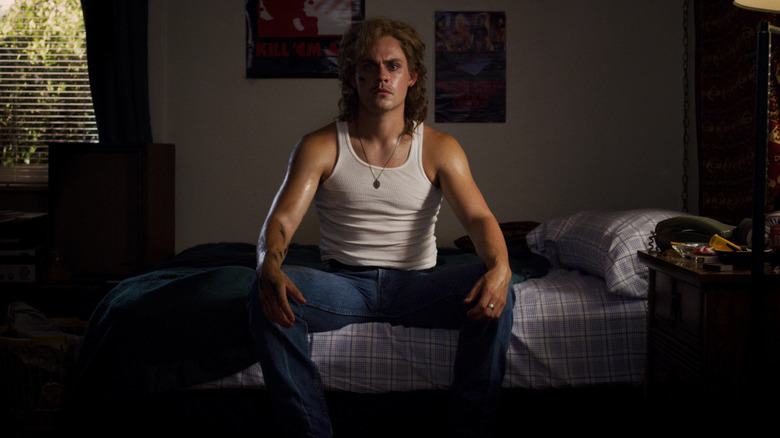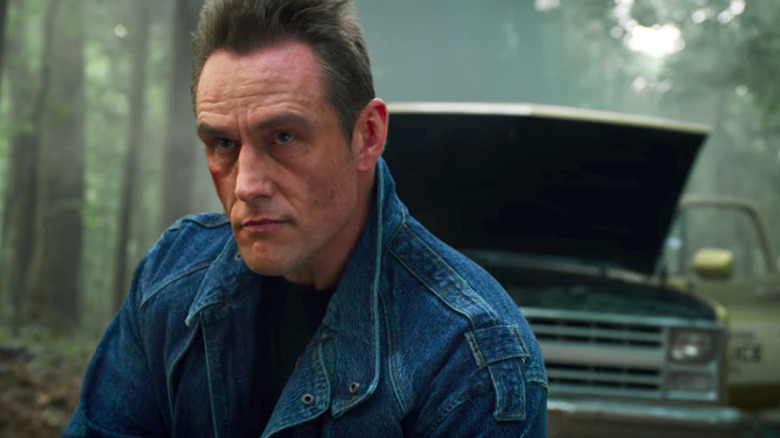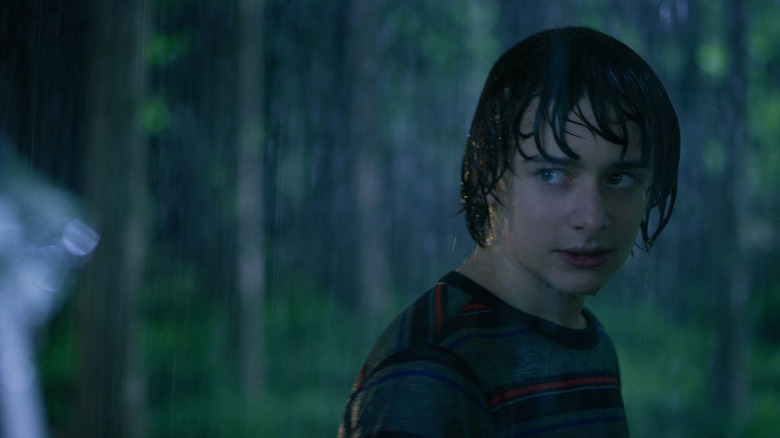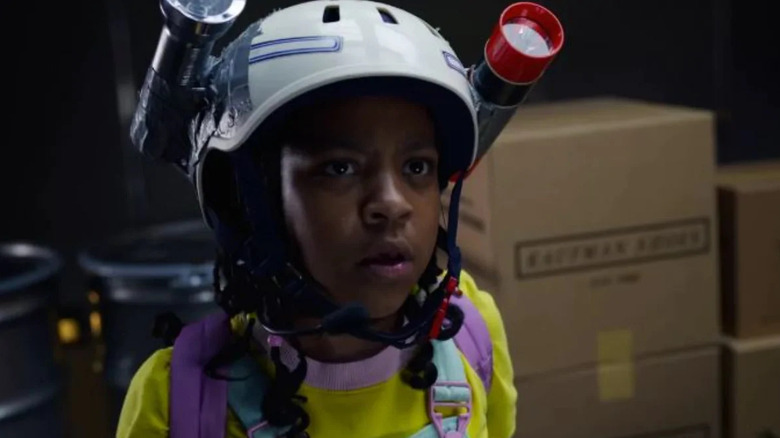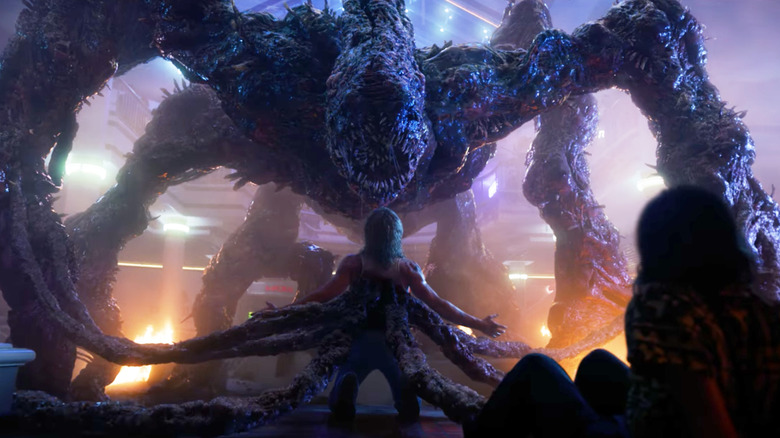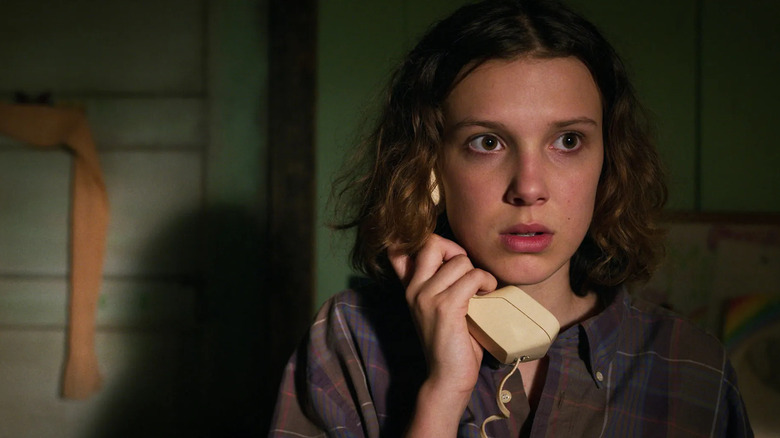The Most Unexpected Things To Happen In Stranger Things
Despite its immense success, "Stranger Things" is something of an oddity in the world of modern television. Nerdy pop culture references, 1980s nostalgia, Stephen King-inspired supernatural storylines — these all feel relatively mainstream now because of the show's success, but when "Stranger Things" Season 1 premiered on Netflix in 2016, they all felt like big creative gambles. Star David Harbour, who plays Jim Hopper in the show, has even said that he heard Netflix was trying to "bury" the series before its initial release.
Regardless of those rumors and the big risk that was "Stranger Things," there's no denying that the show has become one of the biggest hits of the streaming era. The combination of creative writing, flashy retro style, and a fantastic ensemble of multigenerational stars has proven to be a formula for massive success. It also helps that the things that make "Stranger Things" so unique have led to more than a few surprises and twists along the way, keeping audiences on the edge of their seats and maintaining a sense of exploration and discovery, even after multiple seasons.
With a blend of different sci-fi and fantasy subgenres and its huge cast of characters, "Stranger Things" has a lot of innate potential to subvert expectations and deliver big reveals. Here are some of the most unexpected things so far that have occurred on the show.
Eleven's psychic powers
It seems silly now to think of Eleven's telekinetic abilities as a twist, given how pivotal they've been throughout "Stranger Things," but at the very beginning, they came as both a mystery and a shock. Season 1 kicks off with Will Byers getting abducted into the Upside Down by the Demogorgon. Right away, the audience knows that supernatural things are afoot, but the Demogorgon falls more cleanly into monster movie tropes at the start than the superhuman sci-fi of Eleven's storyline.
The reveal that Eleven possess psychic abilities kicks off the real mystery of "Stranger Things" season 1 — how two seemingly-unrelated supernatural phenomena (a shadowy monster from another dimension and a young girl with superpowers) are connected. Each side of the story is thrilling in its own way, but it's their juxtaposition that initially gives "Stranger Things" its unique style within the realm of science fiction. Milly Bobby Brown is captivating from her first shot on screen as Eleven, and the journey of uncovering the true nature of her powers gives the show a ton of its early appeal.
Hopper the hero
When Hopper is first introduced at the start of "Stranger Things" Season 1, he seems to fit pretty neatly into the bumbling sheriff archetype. He's grumpy, single, a heavy drinker, and he doesn't give Joyce Byers' wild theories about her son's disappearance much credence. At least, not at first.
The big surprise with Hopper is that he ends up being incredibly capable. He's cunning and discerning, a good detective, and can more than handle himself in a fight. Once he gets proof of all the nefarious things happening at Hawkins Lab, he transforms from a down-and-out country cop to a driven leader, and that transformation continues in the later seasons as he finds new meaning in taking care of Eleven.
In time, it's revealed that Hopper is more than he seems; his past includes military service and a tragic backstory involving his ex-wife and late daughter. He's still stubborn and grumpy at times, and he keeps his walls up pretty high, but those traits only make him a more fully-formed, intriguing character.
Steve Harrington's redemption arc
Hopper isn't the only "Stranger Things" Season 1 character who ends up being much more than he appears at first glance. For most of the show's early episodes, Steve Harrington is portrayed as the stereotypical '80s cool kid — someone who mixes distaste for school with light bullying to somehow become king of his own, small, teenage world. Nancy Wheeler is clearly into him from the start, but for a while that seems like an objectively bad call, as evidenced by his flippant attitude and cruel treatment of Jonathan Byers.
And yet, by the end of Season 1, Steve manages to redeem himself. The scene where he calls out his friend group of fellow bullies for behaving like jerks is powerful, because it's so unexpected. Joe Keery is naturally charismatic in the role of Steve, but that doesn't mean his complete 180 from high school villain to bumbling big brother figure is at all telegraphed. It's cathartic to see a character take such full ownership of their own mistakes and actively work towards becoming a better person, and that's why Steve has gone from a fun side character to one of the most beloved parts of the entire show.
The Mind Flayer
"Stranger Things" Season 1 features tons of lore, mystery, and danger, but the world of the show expands to a whole other level in Season 2. More than anything, that's due to the introduction of the Mind Flayer: An all-powerful beast at the center of the Upside Down hivemind, which quickly proves itself to be far more formidable than the Demogorgon ever was. With the Mind Flayer positioned as the new big bad from Season 2 onward, the series takes a leap from a small-scale King-esque horror story to a sci-fi epic with the fate of the world on the line.
There's an argument to be made that "Stranger Things" was better when the stakes were lower and the Upside Down was more of a mystery than a villain. On the other hand, the series likely wouldn't have been able to sustain multiple additional seasons without a rise in scale brought by the Mind Flayer and its Season 2 schemes.
Eleven finding her sister
Ask Google what the worst episode of "Stranger Things" is, and you'll find a long list of reviews criticizing Season 2's "The Lost Sister." A lot of people have used a lot of words to explain why they believe the episode to be so disappointing, from its odd one-off structure to its drastic shifts in tone from the rest of the show. Regardless of personal opinion on the episode, however, it does introduce a fascinating piece of lore that expands the world of "Stranger Things" in interesting ways: Eleven's eponymous "lost sister," Kali.
Like Eleven, Kali wields an impressive array of supernatural abilities, though her powers differ significantly from those of the younger girl. Specifically, Kali can manipulate people by psychically feeding them specific images and thoughts. Because so much of Eleven's origin story has been kept a secret throughout "Stranger Things," the fact that she managed to find another person who went through the same experiments was quite unexpected at the time. Kali hasn't factored heavily into the "Stranger Things" story since (possibly due to the episode's poor reception), but a return from her in the future could set up some exciting new plotlines, finally filling in the remaining gaps of the Hawkins Lab plot.
Poor Bob's demise
Season 1 of "Stranger Things" is not without casualties (RIP Barb), but it's still decisively more about scares than kills. The whole core group of characters makes it through alive, and because so many of those characters are kids, it's easy to assume that nobody too close to the center of the story will meet their end on screen. Sean Astin's Bob Newby may not necessarily be a core part of the cast, but his gruesome death in "Stranger Things" Season 2 is no less a shocking, unnerving twist.
Unlike Barb, Bob dies a graphic, bloody, horrifying death in gratuitous on-screen slow-motion, all while Joyce looks on helplessly at the man she loves. Things so often end up okay in "Stranger Things," and Bob's escape from Hawkins Lab looks so successful at first, that it makes his death that much more shocking. It's a clear stakes-raising moment that drives home the global threat posed by the Mind Flayer — and while some may have predicted poor Bob's demise, that didn't make the scene any easier to watch.
Eleven using her powers to fly
By the end of "Stranger Things" Season 2, there was no doubt that Eleven was incredibly strong. When the Mind Flayer's plan started to take shape beneath the ground of Hawkins, it was clear that she would have to be the one to put a stop to it. But her stand against the Mind Flayer in the Season 2 finale was boosted by a surprise: A burst of energy from Eleven so powerful she levitated herself while burning the gate to the Upside Down shut.
Within the established confines of her powers, Eleven being able to levitate makes a good amount of sense, but the moment when she finally does it is still shocking to watch. It's a perfect encapsulation of her journey up to that point — a journey of self-discovery, training, maturing, and eventually, saving the world. In the moment of near-flight, Eleven is untethered by anything, even the Mind Flayer's own immense strength. She is fully free and in her own power, and she quickly closes the gate once her feet leave the ground.
"Stranger Things" hasn't really shown the limits of Eleven's powers of flight, mostly because a brief levitation left her entirely depleted. However, the seed of the Season 2 finale could still be growing in the background of the show, leading to a full-blown flight scene from Eleven somewhere down the line.
Will Byers lives to tell the tale
Despite its many horrors, "Stranger Things" remains a feel-good show. Even so, it's nothing short of a miracle that Will Byers (Noah Schanpp) is still alive and well after all he's been through. The trauma Will has experienced from the first moments of Season 1 nearly matches that of Eleven's childhood. He's survived in a hellscape shadow dimension for weeks on end, been chased by numerous monsters, suffered from PTSD, mind control, and nearly every other torturous experience you can name. Yet he still, somehow, lived to tell the tale.
Of course, "Stranger Things" would be a very different show if Will died sometime in the first two seasons. It would go from a fun adventure series with horror elements to fully dark, leaving Joyce, Jonathan, and all of Will's friends reeling and casting a shadow over every other aspect of the story. It's good, then, that the Duffer Brothers opted to keep Will alive. Will Byers is a survivor through and through, and we can only hope he gets some much needed rest after all he's suffered.
Zombies in Hawkins
If "Stranger Things" Season 2 escalated the scale of the Upside Down threat, Season 3 took things into a whole different realm entirely with its "Flayed" plotline, which pulled heavily from classic zombie movies. Because the Mind Flayer's powers weren't fully defined yet in Season 2, there were a lot of possibilities for where the show could have gone afterwards. Season 3's plot ultimately took the form of Hawkins' residents being indoctrinated into a mindless mob of vicious monsters, leaving the heroes of the show severely outnumbered.
The zombie plotline ended up being a perfect twist on the tried and true "Stranger Things" formula, allowing the show to pull from an entirely different horror subgenre to keep things fresh without changing the core vibe of the series. The notion that any random person on screen could secretly be an agent of the Mind Flayer added an extra level of terror to an already taut story, culminating in the most bombastic "Stranger Things" climax yet.
Russians under Hawkins
Of course, zombies aren't the only hidden threat in "Stranger Things" Season 3. The show's Cold War underpinnings take center stage in its third season, as viewers learn that the Soviet Union has installed a secret military base underneath Hawkins' new Starcourt Mall, where they're attempting to reopen the gate to the Upside Down.
Of course, it's ridiculous. But "Stranger Things" has never hesitated to rush headlong down some absurd rabbit holes, and although the secret underground Russians plotilne feel even more fantastical than the show's sci-fi/fantasy elements, the show makes it work.
Ultimately, the Soviet Starcourt base provides the perfect break from the Upside Down, allowing for a fun, multi-leveled narrative in Season 3 that leaves plenty of room for the show's ever-growing ensemble of characters. The global politics of the 1980s are a major plot device throughout much of "Stranger Things," but they don't fully step out of the shadows until Season 3. Also, the Russian operative Grigori is basically a Terminator, which is a lot of fun in a very '80s way.
Will destroying Castle Byers
This one is an absolute heartbreaker.
Because "Stranger Things" has so many young characters, there's a pervasive coming-of-age theme that runs through the entirety of the show. It hits different characters in different ways at different times — sometimes positively, sometimes not so much. The latter is the case for Will in Season 3, after his best friend tells him coldly that they're not little kids anymore, and that he should feel foolish for wanting to play childhood games with his friends.
It's not exactly controversial to say that Mike Wheeler has been less than likable for a lot of his time on "Stranger Things," but his despicable, self-aggrandizing dismissal of Will's childlike joy is maybe his worst moment. That confrontation leads to a scene of Will tearing down Castle Byers — his secret hideaway fort in the Hawkins woods — with his bare hands.
Fortunately, Season 3 of "Stranger Things" ends with a much more positive outlook on the friendship, wonder, and joy that Mike lambasts Will for clinging to so tightly. Mike's angsty teenage take is shown to be wrong, but not before Will destroys the place that symbolizes his own childhood. His attack on Castle Byers is a shocking low point for a character who largely serves as the show's moral compass, and it hurts to watch — for anyone who has lost things by growing up or anyone who has been hurt by a friend.
Erica Sinclair
Over its first three seasons, "Stranger Things" has introduced a metric ton of characters. Season 1's core group of Eleven, Mike, Nancy, Jonathan, Joyce, Will, and Hopper quickly expanded as Lucas, Dustin, and Steve took on more prominent roles. Then came Max, Billy, Murray, Alexei, Robin, and so many others. It's a deep, rich ensemble now, one that packs the show to near-bursting, but for the most part these later additions complement the series quite well. None of them steal the spotlight as aggressively, however, as the younger sister of Lucas, Erica Sinclair.
Erica may appear prior to Season 3, but it's at that point that she finally gets the chance to shine alongside the main group. Her little girl mastermind persona isn't necessarily original, but it's quite effective when contrasted with the stakes of the "Stranger Things" story. Priah Ferguson injects sharp, aggressively witty life into her performance, proving once again that "Stranger Things" can make a fantastic character of any age.
Billy's sacrifice
Billy Hargrove is, well, not a good person. He's a bully, an abusive brother, and very likely a racist, though actor Dacre Montgomery believes that's not the case.
Whatever the true motivations behind Billy's cruelty, his flaws get a bit more nuance in Season 3 as Eleven glimpses his troubled past — one that includes abandonment, emotional manipulation, and outright abuse from the authority figures in his life. Billy's a bad guy, but he's also a victim of circumstance, making him one of the messiest, most complicated characters in "Stranger Things."
In Season 3, Billy also becomes a primary agent of the Mind Flayer, making it seem like his dark descent will end in an equally evil way. But in his final moments, Billy manages to take hold of himself and stand up for those he has hurt, if only for a moment. His sacrifice gives Eleven and the rest of the team enough time to survive, escape, and ultimately beat the Mind Flayer, providing a bit of redemption for Billy in the end. It's a well-handled, surprising moment given the character's past, adding extra emotional heft to an already heavy climax.
Eleven losing her powers
Unfortunately, Billy Hargrove isn't the only casualty of the Battle of Starcourt. Hooper ends up captured by the Russians and presumed dead, and Eleven survives the fight only to discover that her powers are, at least for the moment, gone. Until the end of Season 3, she's consistently the strongest character and the one largely driving the plot. But in the aftermath of her final encounter with the Mind Flayer, she's just ... normal.
As of now, there's been no explanation for Eleven's lost powers, and there's every chance she could regain them in time. However, until proven otherwise, there's also a possibility that the Upside Down monster robbed her of her abilities for good. Trying to get past that could be a long process, but with a notable time gap separating Season 3 and "Stranger Things" Season 4, Eleven could still come back as strong as ever. Only time will tell.
